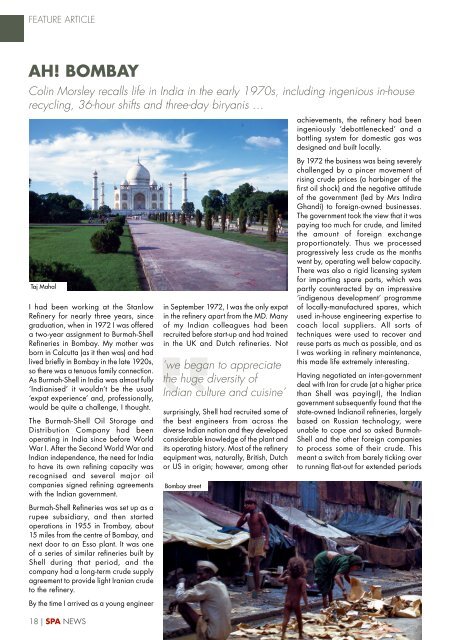You also want an ePaper? Increase the reach of your titles
YUMPU automatically turns print PDFs into web optimized ePapers that Google loves.
FEATURE ARTIcLE<br />
Ah! bOmbAy<br />
Colin Morsley recalls life in India in the early 1970s, including ingenious in-house<br />
recycling, 36-hour shifts and three-day biryanis …<br />
Taj Mahal<br />
I had been working at the Stanlow<br />
Refinery for nearly three years, since<br />
graduation, when in 1972 I was offered<br />
a two-year assignment to Burmah-<strong>Shell</strong><br />
Refineries in Bombay. My mother was<br />
born in Calcutta (as it then was) and had<br />
lived briefly in Bombay in the late 1920s,<br />
so there was a tenuous family connection.<br />
As Burmah-<strong>Shell</strong> in India was almost fully<br />
‘Indianised’ it wouldn’t be the usual<br />
‘expat experience’ and, professionally,<br />
would be quite a challenge, I thought.<br />
The Burmah-<strong>Shell</strong> Oil Storage and<br />
Distribution Company had been<br />
operating in India since before World<br />
War I. After the Second World War and<br />
Indian independence, the need for India<br />
to have its own refining capacity was<br />
recognised and several major oil<br />
companies signed refining agreements<br />
with the Indian government.<br />
Burmah-<strong>Shell</strong> Refineries was set up as a<br />
rupee subsidiary, and then started<br />
operations in 1955 in Trombay, about<br />
15 miles from the centre of Bombay, and<br />
next door to an Esso plant. It was one<br />
of a series of similar refineries built by<br />
<strong>Shell</strong> during that period, and the<br />
company had a long-term crude supply<br />
agreement to provide light Iranian crude<br />
to the refinery.<br />
By the time I arrived as a young engineer<br />
18 | <strong>SPA</strong> NEWS<br />
in September 1972, I was the only expat<br />
in the refinery apart from the MD. Many<br />
of my Indian colleagues had been<br />
recruited before start-up and had trained<br />
in the <strong>UK</strong> and Dutch refineries. Not<br />
‘we began to appreciate<br />
the huge diversity of<br />
Indian culture and cuisine’<br />
surprisingly, <strong>Shell</strong> had recruited some of<br />
the best engineers from across the<br />
diverse Indian nation and they developed<br />
considerable knowledge of the plant and<br />
its operating history. Most of the refinery<br />
equipment was, naturally, British, Dutch<br />
or US in origin; however, among other<br />
Bombay street<br />
achievements, the refinery had been<br />
ingeniously ‘debottlenecked’ and a<br />
bottling system for domestic gas was<br />
designed and built locally.<br />
By 1972 the business was being severely<br />
challenged by a pincer movement of<br />
rising crude prices (a harbinger of the<br />
first oil shock) and the negative attitude<br />
of the government (led by Mrs Indira<br />
Ghandi) to foreign-owned businesses.<br />
The government took the view that it was<br />
paying too much for crude, and limited<br />
the amount of foreign exchange<br />
proportionately. Thus we processed<br />
progressively less crude as the months<br />
went by, operating well below capacity.<br />
There was also a rigid licensing system<br />
for importing spare parts, which was<br />
partly counteracted by an impressive<br />
‘indigenous development’ programme<br />
of locally-manufactured spares, which<br />
used in-house engineering expertise to<br />
coach local suppliers. All sorts of<br />
techniques were used to recover and<br />
reuse parts as much as possible, and as<br />
I was working in refinery maintenance,<br />
this made life extremely interesting.<br />
Having negotiated an inter-government<br />
deal with Iran for crude (at a higher price<br />
than <strong>Shell</strong> was paying!), the Indian<br />
government subsequently found that the<br />
state-owned Indianoil refineries, largely<br />
based on Russian technology, were<br />
unable to cope and so asked Burmah-<br />
<strong>Shell</strong> and the other foreign companies<br />
to process some of their crude. This<br />
meant a switch from barely ticking over<br />
to running flat-out for extended periods



